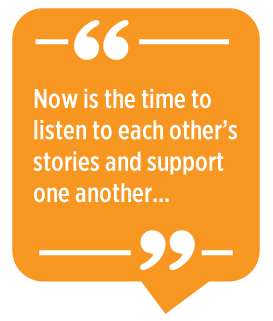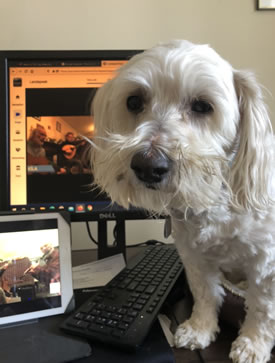TESOL Board Connect: This Year, Graduation Ceremonies Are So Much More
by Shelley K. Taylor

What university holds 28 separate graduation ceremonies in a
little over a month, and why would a TESOL board member happily attend three of
them? In June, my
university held two convocations a day for 9 days in a row, and then
it held two a day for 5 more days in a row in July. I first participated as
“orator” for my faculty and announced the names of graduates crossing the
stage. Next, I attended one family member’s graduation in June, and another
one’s graduation in July. Diplomas had already been sent out, but some students
had had to wait 2 years for their graduation ceremony due to the university
closure in mid-March 2020. Therefore, the reason why my university
held so many graduations in short order this spring was to catch up on all
those missed opportunities to celebrate loved ones’ successes by seeing them
proudly walk across the stage. (And, in two of the three ceremonies I attended,
service dogs crossed the stage as well!)
We have all faced life, work, and educational
challenges since 11 March 2020, when the World Health Organization declared a
global pandemic. Many of us can remember where we were when we heard the
(surreal) news about upcoming work closures. I was in a meeting of Senate on 13
March 2020 when our university president told us to clear key things out of our
offices because we would not be allowed back in them for the foreseeable
future—and all teaching was going online. All of the senators’ jaws dropped,
including mine.
 The instant closure meant that for one course, I
had to teach the last 2 weeks of Winter term using an online platform. We had
already used that platform occasionally, so it did not involve a learning curve
for the students or me. As for my other course, it was designed as an online
course, and we had been using VoiceThread to satisfy an oral component anyway.
Overall, finishing off the term totally online was not too disruptive.
The instant closure meant that for one course, I
had to teach the last 2 weeks of Winter term using an online platform. We had
already used that platform occasionally, so it did not involve a learning curve
for the students or me. As for my other course, it was designed as an online
course, and we had been using VoiceThread to satisfy an oral component anyway.
Overall, finishing off the term totally online was not too disruptive.
The closures did wreak havoc with conferences,
however. Having rotated off the TESOL Board of Directors the year before, I had
jumped into being the local conference chair of the Canadian Association of
Applied Linguistics’ (ACLA) 2020 conference with Program Chairs Dr.
Francis Bangou (ACLA President) and Dr.
Guillaume Gentil (ACLA Vice-President); they were from Ottawa and my
university was hosting ACLA and Congress,
of which ACLA was part. But after that fateful day in March, messages began
swirling around email about conference cancellations: American Educational
Research Association, American Association for Applied Linguistics, Congress
(and ACLA), and, sadly, the annual TESOL convention.
Along with signing up as local conference chair for
ACLA, I had also joined in a consortium of universities in my province to hold
an on-site symposium so local professors and graduate students could meet and
find out about related studies going on not so far away, but that they would
never have known about otherwise. Dr.
Enrica Piccardo was spearheading the consortium and, rather than cancel
it, we ventured into shifting it to an online event.
Having just seen how the first wave of COVID-19 hit
her Italian homeland, Enrica’s rallying cry was: “People need hope.” Therefore,
we decided against cancelling the symposium. Hosting it online turned out to have
a steep learning curve (Zoom-bombing, links that wouldn’t link, etc.), but at
the end of the day it was a success because it provided a sense of community.
TESOL also dusted itself off and took a giant leap of faith, offering its first
fully online convention a few months later—also providing a much-needed sense
of community.
 Before everyone caught on to Zoom, I was able to
catch up on work. Since I already had pets, there was no need to get a pandemic
puppy, and I started learning a new language online, which, as it turned out,
was me getting my just reward.
Before everyone caught on to Zoom, I was able to
catch up on work. Since I already had pets, there was no need to get a pandemic
puppy, and I started learning a new language online, which, as it turned out,
was me getting my just reward.
Previously, I had incorporated an online language
learning component into a graduate course on language learning. My students
endeavored to not only read about language learning, but to dip their toes into
doing so themselves (using the online program of their choice). One criterion
was that the target language not be in the same language family as any
language(s) they already knew. Their assignments involved comparing their
personal experiences to the sage advice of their readings. I thought the task
would be easier for me because I had an online instructor via Zoom, and
classmates that I could see and hear online. (Nobody kept their camera off).
I discovered, however, that learning synchronously
and having “live” classmates sometimes placed me at a disadvantage. By learning
a Gaelic language, I fulfilled the criterion that it not be related to any
languages I had studied before (language families, orthographies, etc.). It had
been a while since I had ventured off the deep end and exposed myself to a
totally unknown language, but, still, I was not immersed or submersed in it; we
just met synchronously on Zoom as a cohort with an instructor for a few hours a
week. I began to fear the false beginners who would go “off script,” and leave
we rank beginners in the dust as we clung onto our limited vocabulary and the
few phrases we had learned.
I also experienced all the discomfort that
metacognition (second
language anxiety, the monitor
model—read more about the monitor model here,
p. 15) could throw my way; however, my biggest distress came from accidentally
turning the camera of my iPad the wrong way and not noticing what was showing
up in gallery view until there was no turning back. The horror! The horror! I
kept emailing (uninvited) reflections on my learning process to a colleague
that spoke the language I was learning, reflections sprinkled with: “It’s so
hard!” and “How did you ever learn that language?” When I looked back on these
messages later, I thought: “Ohhh, maybe I wasn’t dealing with total lockdown,
masks, people dying, and fear as well as I thought I was.”
And yet, I was able to work from home. I did not
lose my job, I did not end up in the hospital, and my short-lived discomfort
with language learning did not interfere with my grasping the content of
central topics. Neither was it crucial to my grade progression nor to my
completing a degree. My thoughts turn to multilingual
learners lacking a sufficient number of devices or connectivity at
home, to colleagues in my university who had never ventured into online
teaching before, and to elementary and secondary teachers who did not have the
luxury of shifting their teaching onto familiar platforms or who sought to
deliver all teaching on cell phones via WhatsApp. In my province, schools had
already been closed for 26 weeks by the end of the 2020–2021 school year
(Wadehra, 2021), and more closures followed right up to January 2022.
We are still in a process of catching up: catching
up on content learning and teaching, on language and literacy development, and
on important life events. Catching up on travelling (hence the bedlam in many
airports); socializing; being able to see a doctor in person instead of over
the telephone; attending weddings, sports events, and—heck—even standardized
testing in person. And yet, even with all this playing of catch-up, now is a
time for us in the TESOL community to celebrate our achievements.
Now is the time to listen to each other’s stories
and support one another, and to walk across the metaphorical stage and
celebrate—with our students, colleagues, friends, families, service pets and
pandemic puppies or goldfish, as the case may be. We are nimble, we are here,
and we are more international than ever. Yay, us!
Reference
Wadehra, R. (2021). The impact of school
closures on Ontario students. Centre for Global Social Policy. https://cgsp-cpsm.ca/ceic/2021/07/05/theimpactofschoolclosures/
Shelley K.
Taylor, professor, teaches in the graduate
TESOL/Applied Linguistics and Bachelor of Education program at the University
of Western Ontario. She has conducted research on multilingual language
education and language policy in Canada, Denmark, Greenland, and Nepal, and on
youth refugees’ language and literacy learning. She has also chaired TESOL’s Bilingual-Multilingual
Education Interest Section, served on the (former) nominating and professional
development committees and the board of directors, and served as associate
convention program chair for TESOL 2015, as well as contributing to numerous
TESOL publications (as editor and author).